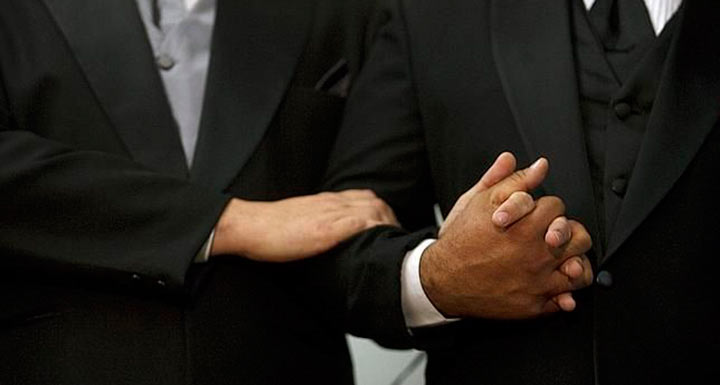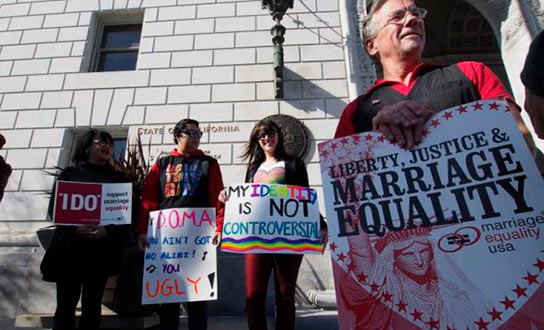
Same-sex marriage, a debate in Florida
![Santiago, Miami / "My partner died 18 years ago – exactly after we celebrated our 15th anniversary. With him went all my savings, the business we had together, and the house we bought. We lived in Las Vegas and had a prosperous life, but legally I had no right to the things that were under his name, so I came to Florida with nothing to call my own. I do not want this to happen with my current partner, or that it happen to him. A law that enables us to have the right to inherit, to each other’s retirement savings and that recognizes us as a legal union is our right. Our sexual orientation should not make us different.” ____________________________ Sandra and Jessica, West Palm Beach / "We have a beautiful daughter who has the right to call us both mom and needs the protection of both. The law can not be different for some and for others. Florida seems to live in the time of the Civil War, we are a state with backward and old ideas, even though we have a fairly large gay community. We will have another child, and hope it is born in a state where its parents can be married regardless of their sex. " ____________________________ Roberto, Miami / "I do not believe in marriage, in other words, I will never marry, but I understand those who want to. Maybe in the future I might want to, but I don’t believe that to have children you need to have a heterosexual partner. I think this law needs to be passed, this is the country of freedom, let us be free to think what we think. "]()
- Santiago, Miami / “My partner died 18 years ago – exactly after we celebrated our 15th anniversary. With him went all my savings, the business we had together, and the house we bought. We lived in Las Vegas and had a prosperous life, but legally I had no right to the things that were under his name, so I came to Florida with nothing to call my own. I do not want this to happen with my current partner, or that it happen to him. A law that enables us to have the right to inherit, to each other’s retirement savings and that recognizes us as a legal union is our right. Our sexual orientation should not make us different.”
- Sandra and Jessica, West Palm Beach / “We have a beautiful daughter who has the right to call us both mom and needs the protection of both. The law can not be different for some and for others. Florida seems to live in the time of the Civil War, we are a state with backward and old ideas, even though we have a fairly large gay community. We will have another child, and hope it is born in a state where its parents can be married regardless of their sex. “
- Roberto, Miami / “I do not believe in marriage, in other words, I will never marry, but I understand those who want to. Maybe in the future I might want to, but I don’t believe that to have children you need to have a heterosexual partner. I think this law needs to be passed, this is the country of freedom, let us be free to think what we think. “
MIAMI — Abraham Lincoln once said that “it is difficult to make a man miserable while he feels worthy of himself,” but dignity is a statute at risk that often depends on decisions and valor in the face of the future.
In the United States, same-sex marriage is recognized in 19 states, three tribal jurisdictions and the District of Columbia. Despite its validity at the federal level, the Supreme Court ruled on June 26, 2013, that it would be valid only in those states that legalized it previously.
In Florida, the debate is legal and political. Although same-sex marriage here is prohibited, three judges, citing federal law, have approved and recognized a union of two people of the same sex.
In the traditionally conservative Miami-Dade County, Judge Sarah Zabel declared the ban unconstitutional, claiming that it serves no political objective and “serves only to hurt, to discriminate, to deprive same-sex couples and their families of equal dignity, to label and treat them as second-class citizens.”
Judge Zabel’s decision is joined by that of federal Judge Luis M. García, who ruled in the same manner in Monroe County, declaring the ban illegal and authorizing the celebration of marriages in his jurisdiction.
In his argument, he said that he is “aware that a majority of the voters is opposed to marriage between people of the same sex, but it is part of the proud history of our country to protect the rights of the person, the rights of the unpopular and the rights of the powerless.”
Although he ordered that marriage licenses be issued at once, the measure is awaiting an appeal.
A third judge, Dale Cohen — also in Monroe County, which includes the Florida Keys, openly gay-friendly territory — not only certified the unconstitutionality of the ban but also declared it illegal, allowing a couple in his jurisdiction to seek divorce.
The three judicial rulings are on hold, appealed by Florida’s Attorney General, Pam Bondi, with the argument that “neither this Court nor the Florida Supreme Court can decide this federal issue with finality. The United States Supreme Court, however, has the final word on the United States Constitution.”
“The State of Florida will respect the United States Supreme Court’s final word,” she wrote. “In the meantime, this Court should preserve taxpayer and judicial resources by staying briefing until the United States Supreme Court rules.”
The prosecutor goes further in its arguments, placing herself on the side of her fellow Republican, Florida Governor Rick Scott, and invading the space of judicial independence by saying that federal courts should not legislate on state laws with relation to gay marriages.
The Attorney General’s positions point to a conservatism that calls upon traditional and religious values. In a statement issued by her office, she says that “Florida’s marriage laws […] have a close, direct, and rational relationship to society’s legitimate interest in increasing the likelihood that children will be born to and raised by the mothers and fathers who produced them in stable and enduring family units.”
Charlie Crist, who hopes to defeat Scott, the incumbent governor, has positioned himself on the side of same-sex marriage. Referring to the governor and the Attorney General, he urges them to “cease and desist on fighting gay marriage — same-sex marriage — and equality. The time has passed to do that.”
Crist has been criticized for his marked political use of this sensitive topic, since in 2006 he signed a petition to approve the ban on homosexual unions in favor of traditional marriage. In 2008, while governor, he voted in favor of the ban.
It was only last year that he began to defend the rights of homosexuals, promising that, if elected, he will prohibit any discrimination against LGBT employees [lesbian, gay, bisexual, transsexual] in all agencies and contract enterprises under state control.
What’s paradoxical about the situation in Florida is that, even though no law permits marriage or civil union between persons of the same sex, the lawsuits filed by homosexual couples have been received favorably by the courts because they are phrased as an issue of rights protected by the U.S. Constitution.
In January of this year, six couples sued the State of Florida, asking for the right to marry. Their attorneys argued that “Florida’s categorical exclusion of all same-sex couples from marriage deny same-sex couples, including the plaintiff couples, and their families the fundamental rights, dignity, and equality guaranteed to all persons by the United States Constitution.”
Organizations such as Equal or Equality Florida promote a referendum during the 2016 elections to guarantee the rights of the gay community. Because of the number of voters, they need to collect 60,000 signatures, although their goal is one million supporters.
In 2008, 60 percent voted against the civil union of same-sex couples; by 2012, 43 percent were in favor, 45 percent were against and 12 percent were undecided.
Another interesting aspect of the United States’ complex legal structure is that, after the Supreme Court voided the Defense of Marriage Act (DOMA) as unconstitutional, it implicitly accepted the unions between same-sex persons and granted all rights to the couples that were already married.
In its ruling, the court said that DOMA “implies a privation of equal freedom to the people, which is protected by the Fifth Amendment.”
The repeal of DOMA allowed Traian Popov, a Bulgarian immigrant, to be the first to receive permanent residence and look forward to becoming an American citizen in 2018 by virtue of his marriage to Julian Marsh, an American citizen. The couple married in New York and, after the Supreme Court ruling, which recognizes the rights of homosexual couples already married, Popov corrected his immigration situation.
Coincidentally, Popov and Marsh live in Florida. Thus, they made this state — in which they couldn’t have been legally united — into the first state in the Union to have a legal resident as the result of a homosexual marriage.
While waiting for the approval of the most conservative sector of state politics, Florida prepares. Numerous agencies are planning idyllic same-sex weddings on the beaches and white sands of Florida. They promise a paradisiacal location, preceded by the fame of South Beach and the gay discos that have made the city’s nights famous.
Beyond economic, political or campaign use, the issue at heart is the right of people to decide about their own lives, to express their sexuality and choose the family they want to have.
We are all equal before the law. Now we must find out if we’re equal in the eyes of men, or if another Lincoln axiom — “all men are created equal” — ceases to apply after birth.



